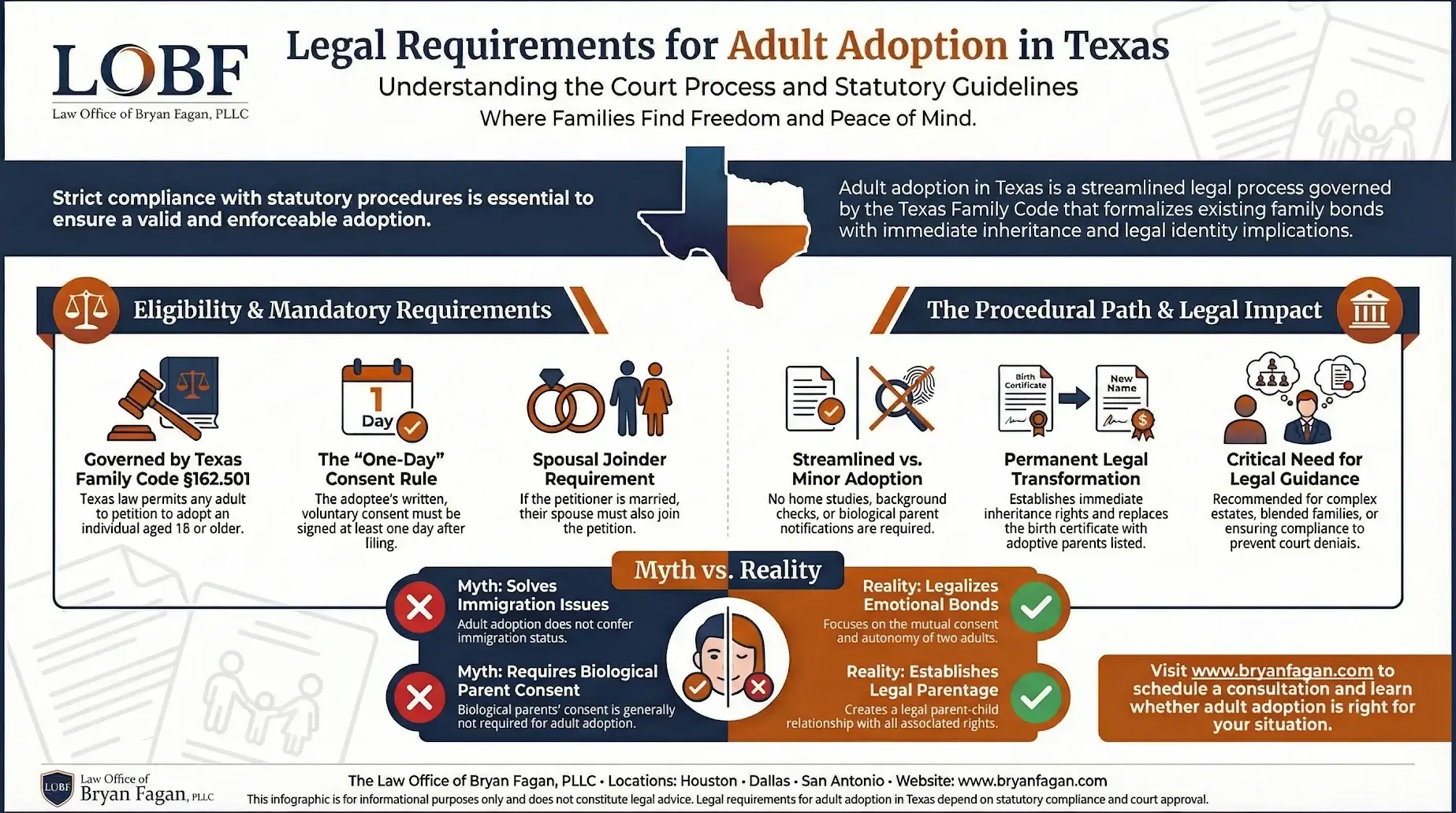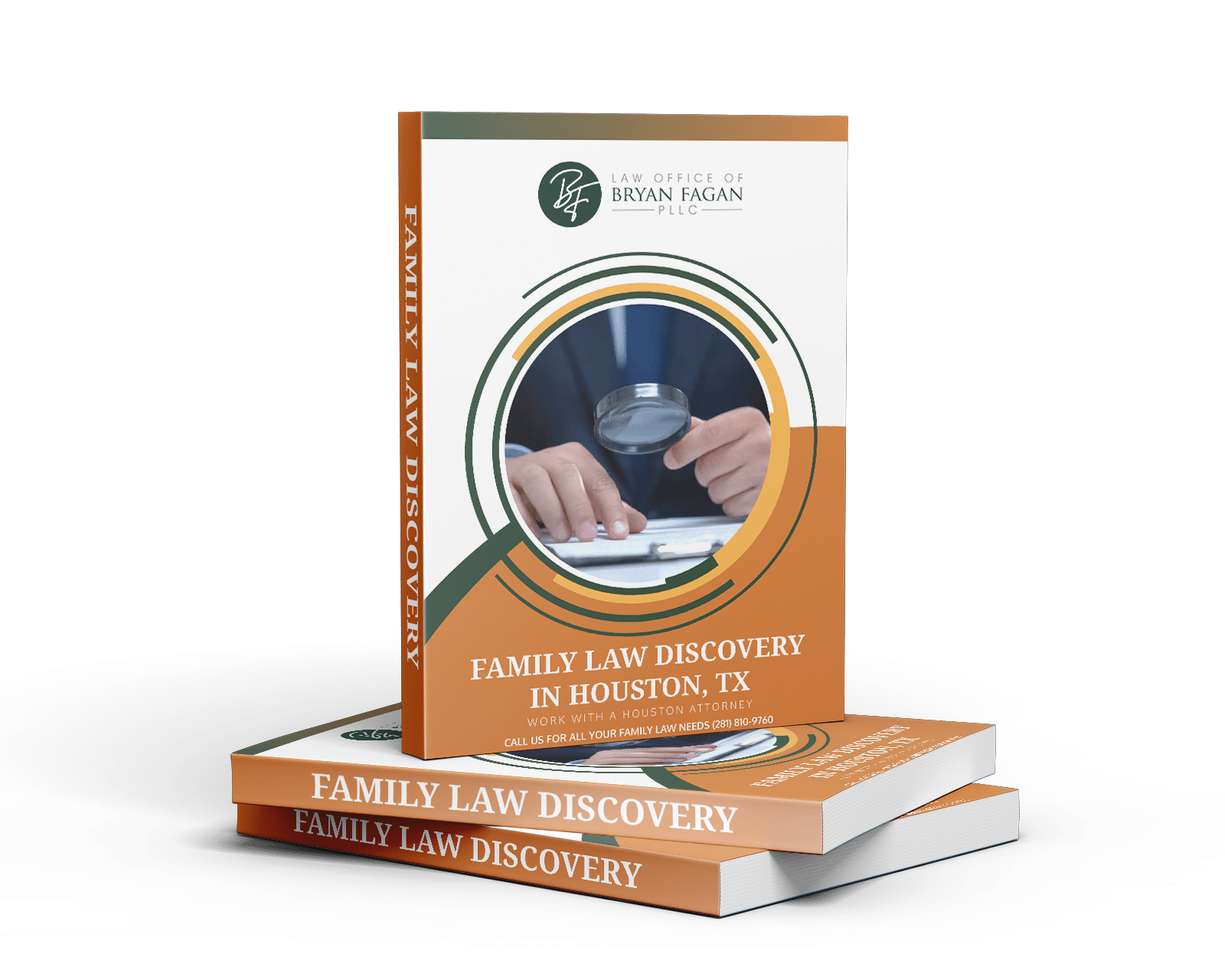
Have you ever looked at the person who helped your child survive the hardest school year of their life and thought, “They’ve been the real parent all along”? For many Texas families, questions about custody, academic struggles, and long-term stability eventually lead to a deeper legal conversation about permanence. Legal Requirements for Adult Adoption in Texas often become part of that journey—especially when a stepparent or grandparent has provided the steady support that carried a child through divorce and classroom disruption.
When parents separate, children frequently feel the impact first at school. Grades slip. Focus fades. Teachers notice behavioral changes. Texas courts recognize this reality. Under Texas Family Code §153.002, judges must base custody decisions on the best interest of the child, and educational continuity is a key factor in that analysis. Years later, when that child becomes an adult, Texas Family Code §162.501 provides a legal pathway to formalize the parent-child bond that may have safeguarded their academic and emotional growth.
At The Law Office of Bryan Fagan, PLLC, we believe families deserve clarity during life’s most uncertain seasons. Founded by Bryan Joseph Fagan, a South Texas College of Law graduate and recognized authority on Texas divorce and custody law, our Houston-based firm is committed to empowering parents to reclaim peace of mind. Whether protecting a child’s educational stability during divorce or guiding a family through adult adoption, our approach remains the same: compassionate counsel, practical education, and innovative legal solutions that simplify complexity.
If you are navigating custody concerns, worried about how divorce is affecting your child’s academic performance, or considering adult adoption to legally affirm a lifelong relationship, you are not alone. In the sections ahead, we will explain how Texas courts evaluate educational stability, what the legal requirements for adult adoption in Texas truly involve, and how thoughtful legal planning can protect your child’s future with confidence and care.
Key Takeaways
- The adoptee must be at least 18 years old with no upper age limit under Texas Family Code §162.501, and the petitioner must have general legal capacity to file in a Texas district court or statutory county court.
- Written, voluntary consent from the adult adoptee is mandatory—this consent must be documented on the proper consent forms and signed at least one day after the petition is filed to ensure it’s not coerced.
- Biological parents’ consent is not required for adult adoption in Texas, as no order terminating parental rights is necessary, distinguishing adult adoption from minor child adoption.
- A court hearing is required where typically both the petitioner and adopted adult must appear before a judge who reviews the petition, verifies consent, and enters a final decree of adoption.
- Adult adoption creates the same legal rights as biological parentage, including full inheritance rights under Texas intestacy law and potential name change opportunities on a new birth certificate.
Legal Requirements for Adult Adoption in Texas: The Basics
Understanding the Legal Requirements for Adult Adoption in Texas begins with Texas Family Code §162.501, the statute that expressly authorizes the adoption of individuals who are 18 years of age or older. Under this provision, any adult with legal capacity may file a petition to adopt another adult, provided the adoptee signs written, voluntary consent in compliance with statutory timing requirements. Once approved, the court’s decree establishes a legal parent-child relationship with the same force and effect as biological parentage, including rights that may extend to inheritance under the Texas Estates Code. The current framework of Chapter 162 continues to reflect the Legislature’s intent to make adult adoption accessible while preserving judicial safeguards to prevent fraud or coercion.
Unlike minor adoption proceedings, which may require termination of parental rights under Chapter 161 and a best-interest analysis pursuant to §153.002, adult adoption is more streamlined. There is no requirement for a home study, no court-appointed investigation into the adoptee’s best interest, and no termination proceeding. Because the adoptee is a legal adult capable of making independent decisions, the court focuses on confirming that proper consent has been executed and that the petition complies with procedural rules. Judges maintain oversight to ensure the adoption serves a legitimate and lawful purpose, but the process respects the autonomy of the adult involved.
Families who would like a deeper explanation of how this process works in practice can review our detailed guide on adult adoption in Texas and how it works. For broader adoption information, our Texas adoption resource center provides additional insight into the statutory requirements and court procedures involved throughout the state.
At The Law Office of Bryan Fagan, PLLC, our focus remains on educating families and protecting futures. Adult adoption is often about formally recognizing the bond that has already existed for years. While the legal requirements must be followed carefully, the outcome is deeply personal and lasting. By combining a clear understanding of Texas Family Code Chapter 162 with compassionate, client-centered guidance, our team helps families transform meaningful relationships into secure legal protections that stand the test of time.

Age and Eligibility Requirements
The most fundamental requirement under Texas law is straightforward: the adoptee must be at least 18 years old. Texas Family Code §162.501 sets this age threshold with no upper limit—whether someone is 19 or 79, they can be adopted as an adult in Texas.
For the petitioner (the person seeking to become the adoptive parent), Texas requires general legal capacity. This means the petitioner must be of sound mind and not under any legal disability that would prevent them from entering into binding legal agreements. There’s no requirement that the petitioner be a certain age beyond legal adulthood, nor any restriction based on marital status. Single individuals, married couples, same-sex partners, grandparents, and former foster parents can all petition to adopt an adult.
Venue and residency matter as well. The petition must be filed in the district court or statutory county court of the county where the petitioner resides. While the adoptee doesn’t need to be a Texas resident, the adopting parent’s residence determines where the case is heard. This ensures local court oversight of the adult adoption process.
If the petitioner is married, Texas law requires the spouse to join the petition as a co-petitioner. This spousal joinder requirement reflects the reality that adoption creates legal relationships affecting the entire family unit.
Consent Requirements
Consent sits at the heart of every adult adoption in Texas. Unlike child adoption, where courts must protect a minor’s interests, adult adoption involves parties who can speak for themselves. However, that consent must meet specific legal standards.
The adult adoptee must provide written, voluntary consent. This consent must be documented on the proper adoption form—typically the Consent of Adult Subject to Adoption form (FM-AA-202 or the appropriate set depending on whether a name change is requested). Critically, this consent cannot be signed until at least one day after the original petition is filed. This timing requirement exists to protect against coercion, ensuring the adoptee has time to consider the legal implications.
The consent must be truly voluntary—free from duress, fraud, or undue influence. If a judge suspects the adult adoptee was pressured into consenting, the court has authority to deny the adoption.
Biological parent’s consent is not required. This represents one of the most significant differences between adult adoption and child adoption. Because the adoptee is a legal adult capable of making their own decisions, the biological parents have no veto power and don’t even need to be notified of the proceeding. No order terminating parental rights is necessary.
If the adult adoptee is married, spousal consent requirements may come into play, particularly if the adoption affects matters like inheritance or legal obligations. Courts have discretion to examine whether an adoptee’s spouse should consent, though this isn’t universally mandated in every case.
Required Legal Documents
Proper documentation is one of the most important parts of complying with the Legal Requirements for Adult Adoption in Texas. Even though adult adoption under Texas Family Code §162.501 is more streamlined than minor adoption proceedings governed by Chapters 153 and 161, courts still expect strict procedural accuracy. Incomplete, improperly formatted, or incorrectly timed documents are among the most common reasons petitions are delayed or rejected. At The Law Office of Bryan Fagan, PLLC, we regularly guide families through these technical requirements to ensure their adoption proceeds smoothly and without unnecessary setbacks.
The process begins with filing an Original Petition for Adoption of an Adult in the district court or statutory county court of the petitioner’s county of residence. This foundational pleading must comply with Texas Family Code Chapter 162 and the Texas Rules of Civil Procedure, clearly identifying the parties and affirming that the adult adoptee is at least 18 years old and capable of giving voluntary consent. Along with the petition, courts require a Civil Case Information Sheet (PR-Gen-116), which assists the clerk’s office in processing the case.
One of the most critical documents is the Consent of Adult Subject to Adoption. Under §162.501, the adult adoptee must provide written, voluntary consent, and courts carefully review the timing and execution of that consent to confirm compliance with statutory safeguards. In addition, a Proposed Decree of Adoption of an Adult must be prepared in advance of the hearing. Whether or not a name change is requested, the decree must accurately reflect the relief sought. Any changes made after the adoptee signs the consent must be clearly acknowledged to avoid questions about voluntariness.
Families must also complete the Certificate of Adoption (VS-160), which allows the Texas Department of State Health Services to issue an updated birth certificate once the court signs the final decree. A Request to Redact Sensitive Data (FM-AA-204) is typically filed to protect confidential information such as Social Security numbers and driver’s license details from becoming part of the public record. If either party has certain criminal history, additional documentation may be required, and name changes can trigger statutory notification obligations under other sections of Texas law.
Because adoption permanently alters legal relationships, including inheritance rights under the Texas Estates Code, courts expect every requirement to be satisfied precisely. For families who want to better understand why adult adoption is pursued and how the procedure works, we encourage reviewing our in-depth guide on adult adoption in Texas: why, when, and how it works, as well as our broader Texas adoption resource center.
At our Houston-based family law practice, we know these forms represent more than paperwork. They are the legal foundation for recognizing a lifelong bond. By carefully preparing and reviewing each required document, families can confidently move forward, knowing they have met the statutory standards and protected the future of the relationship they are formalizing.

Court Hearing Requirements
Adult adoption in Texas requires a brief court hearing—you cannot simply file paperwork and receive a decree by mail. This hearing serves as a safeguard ensuring the adoption meets all legal requirements and involves no fraud or coercion.
Both the petitioner and the adult adoptee typically must appear before the judge in district court or statutory county court. Attendance waivers are rare and granted only for demonstrated good cause, such as severe illness or significant disability preventing travel. The court takes the hearing requirement seriously because it provides an opportunity for the judge to verify that all parties involved understand the legal consequences.
During the hearing, the judge reviews all filed documents, confirms that consent was properly obtained and voluntary, examines the legal capacity of both parties, and ensures no fraudulent purpose motivates the adoption. Common concerns include attempts to circumvent creditor claims, avoid legal obligations, or manipulate immigration status.
If satisfied that all legal requirements for adult adoption in Texas are met, the judge signs the Decree of Adoption. At that moment, the adoption becomes final, and a new legal relationship is established between the adoptive parents and the adopted adult.
After the hearing, the court clerk completes section 4 of the VS-160 Certificate of Adoption, applies the court seal, and includes the new legal name in the appropriate field. This certificate, along with the Texas Birth Certificate Application (VS-140) and required fees, must be submitted to the Texas Department of State Health Services Vital Statistics Unit to obtain a new birth certificate reflecting the adoption.
Legal Effects of Adult Adoption
When a Texas judge signs a final decree of adoption under Chapter 162 of the Texas Family Code, the legal consequences are immediate and lasting. By satisfying the Legal Requirements for Adult Adoption in Texas, families create a legally recognized parent-child relationship under §162.501 that carries the same rights and responsibilities as biological parentage. This is not simply a symbolic gesture. It is a binding legal act that affects inheritance, identity, and long-term family structure in meaningful ways.
One of the most significant effects involves inheritance rights. Once the adoption is finalized, the adopted adult gains the same intestate inheritance rights as a biological child under the Texas Estates Code if the adoptive parent passes away without a will. This means the adoptee stands on equal footing with other children for estate distribution purposes. Depending on how estate planning documents define terms like “child” or “descendant,” the adoption may also impact trust distributions, beneficiary designations, and retirement accounts. Because these consequences are permanent, our Houston-based family law team encourages families to review their estate plans alongside the adoption process to ensure everything aligns with their goals.
It is equally important to understand the shift that occurs regarding biological parents. In most situations, adult adoption terminates intestate inheritance rights from biological parents, although those parents may still leave assets through a valid will. This is a serious legal consequence that should be discussed openly before proceeding. Our firm’s approach focuses on clarity and informed decision-making so families fully understand both the benefits and the long-term implications.
Adult adoption can also include a name change within the final decree, eliminating the need for a separate legal proceeding. In certain contexts, the adoption may influence legal standing for medical decision-making or access to records, depending on how other state and federal laws apply. However, adult adoption does not retroactively change prior legal obligations, erase existing marriages, or automatically alter immigration status, which is governed by federal law. Courts maintain oversight to ensure compliance with statutory safeguards and to prevent misuse of the process.
Families who would like to explore these issues further can review our detailed discussion on adopting an adult in Texas and our comprehensive Texas adoption resource center. For additional insight into how and why families pursue adult adoption, we also provide guidance in our article on adult adoption in Texas: what it is and how it works.
At The Law Office of Bryan Fagan, PLLC, we believe protecting your future begins with understanding your options. Adult adoption is a powerful legal step that formalizes bonds already built on years of love and support. By carefully following Chapter 162 of the Texas Family Code and seeking knowledgeable legal guidance, families can move forward with confidence, knowing their relationships are both emotionally meaningful and legally secure.

How Adult Adoption Differs From Minor Adoption in Texas
Understanding the distinctions between minor and adult adoption helps families appreciate why the process is often more efficient while still carrying full legal weight. When clients begin reviewing the Legal Requirements for Adult Adoption in Texas, they quickly see that adult adoption, governed primarily by Texas Family Code §162.501, is structured differently from the adoption of a minor child. Although both processes ultimately create a legally binding parent-child relationship, the procedural steps reflect the autonomy of an adult adoptee and the Legislature’s intent to streamline the process without sacrificing judicial oversight.
One of the most significant differences is that no termination of parental rights is required for adult adoption. In minor adoption cases, Texas Family Code Chapter 161 requires the termination of a biological parent’s rights before an adoption may proceed. This can involve contested hearings, evidentiary standards, and detailed best-interest analysis under §153.002. By contrast, adult adoption does not require a Chapter 161 proceeding because the adoptee, being 18 or older, has the legal authority to provide written, voluntary consent under §162.501. The court’s role is to confirm compliance with statutory requirements rather than evaluate parental fitness.
There is also no home study requirement in adult adoption cases. Minor adoptions often involve social studies, background checks, and evaluations of the adoptive parent’s home environment. Those safeguards exist to protect children who cannot advocate for themselves. Adult adoptees, however, are legally competent to make their own decisions, which eliminates the need for investigative procedures. Similarly, courts do not conduct a formal best-interest analysis for adult adoption because the adoptee’s consent carries significant legal weight under the Family Code.
These structural differences often result in a faster timeline. While minor adoptions can take months or even longer depending on the complexity of the case, adult adoption cases frequently conclude within weeks once the petition, consent, and required documentation are properly filed and scheduled for hearing. Reduced procedural requirements also mean lower overall costs, as there are no home study fees or extended litigation expenses.
For stepparents who have raised a child into adulthood, this streamlined process can provide meaningful legal closure. It allows families to formalize a bond that has already existed in practice for years, without revisiting the legal hurdles that would have applied during childhood. Families in Central Texas seeking local guidance can learn more through our San Antonio adoption attorneys page, and we also provide a broader overview in our Texas adoption resource center. You can explore additional information here: San Antonio adoption attorneys.
At The Law Office of Bryan Fagan, PLLC, our focus is always on educating families and protecting futures. Whether guiding a client through the complexities of Chapter 161 in a minor adoption or helping an adult adoptee navigate §162.501, our team combines statutory precision with compassionate advocacy. Adult adoption may be simpler procedurally, but its impact is lifelong. By ensuring every requirement is satisfied and every question is answered, we help families move forward with confidence and legal certainty.
Situations Where Adult Adoption May Not Be Approved
While adult adoption in Texas is straightforward when requirements are met, courts maintain authority to deny petitions that raise legitimate concerns.
Fraudulent purposes represent the most common basis for denial. If a judge believes the adoption is designed to circumvent creditor claims, evade legal obligations, gain improper access to benefits, or manipulate inheritance in ways that harm others, the petition will likely be denied. Judges are trained to recognize when an adoption seems designed for purposes other than establishing a genuine parent-child relationship.
Coerced or defective consent will doom an adoption. If the adult adoptee’s consent wasn’t truly voluntary—whether due to duress, mental incapacity at the time of signing, fraud, or undue influence—the legal foundation crumbles.
Procedural defects in filing can also prevent approval. Using incorrect forms, filing in the wrong county, failing to include required documents, or having consent signed before the petition is filed all create problems. Some procedural errors can be corrected; others require starting over.
Jurisdictional issues arise when the petition isn’t filed in the proper court or when questions exist about the petitioner’s true residence. Texas courts must have proper authority over the matter to enter a valid decree.
Common Myths About Legal Requirements for Adult Adoption in Texas
Misconceptions about adult adoption can lead families to make poor decisions or miss important steps. Let’s correct the most common myths:
Myth: “Adult adoption is automatic.” False. While simpler than minor adoption, adult adoption absolutely requires a formal petition, proper consent documentation, a court hearing, and a signed decree of adoption. No adoption occurs without judicial approval.
Myth: “You need biological parents’ approval.” Incorrect under Texas law. Because the adoptee is an adult capable of making their own decisions, biological parent consent isn’t required, and they don’t even need to be notified. The adult adoptee’s consent is what matters.
Myth: “Adult adoption has no real legal consequences.” Untrue—and dangerously so. Adult adoption creates the same legal rights as biological parentage, fundamentally altering inheritance rights, legal relationships, and family structure. These consequences persist for generations.
Myth: “Adult adoption automatically changes immigration status.” No. Immigration law is federal, and state adoption doesn’t confer citizenship, visa benefits, or other immigration advantages. Anyone considering adult adoption for immigration purposes should understand this critical limitation.
Why Legal Guidance Matters in Adult Adoption Cases
Even though adult adoption involves a simpler legal procedure than child adoption, the stakes remain high. Working with an experienced adoption attorney provides crucial advantages.
Ensuring compliance with statutory requirements prevents delays and denials. Texas Family Code Chapter 162 sets specific requirements, and missing any of them creates problems. An attorney familiar with Texas adult adoptions knows exactly what’s required.
Preparing correct documentation saves time and frustration. From ensuring consent forms are signed at the right time to properly completing VS-160 forms for birth certificate updates, documentation precision matters.
Coordinating court appearances ensures the hearing goes smoothly. Understanding what judges look for and how to present the petition professionally increases the likelihood of approval.
Advising on inheritance and estate consequences helps families understand the full implications. Adult adoption affects wills, trusts, intestate succession, and tax treatment of inherited assets. Understanding these effects before the decree is signed allows families to plan accordingly.
Securing a legally enforceable decree means the adoption will withstand future challenges. Proper handling of every step creates a rock-solid legal foundation for the new parent-child relationship.
Understanding the legal requirements for adult adoption in Texas fully—and meeting them precisely—is what transforms an emotional bond into permanent legal recognition.
Why Choose The Law Office of Bryan Fagan, PLLC
At The Law Office of Bryan Fagan, PLLC, we bring years of hands-on experience guiding families through the Legal Requirements for Adult Adoption in Texas, including proceedings governed by Texas Family Code §162.501 and the broader framework of Chapter 162. Adult adoption may be more streamlined than minor adoption, but it still requires strict compliance with statutory consent provisions, proper filing procedures, and judicial approval. Our team understands that behind every petition is a deeply personal story—one rooted in loyalty, support, and the desire to formally recognize a lifelong bond.
Texas law has preserved a clear path for adult adoption, allowing individuals age 18 and older to be adopted when written, voluntary consent is properly executed and the court determines the adoption is lawful and not pursued for an improper purpose. While no termination of parental rights or home study is required, courts remain vigilant in reviewing petitions to ensure procedural accuracy and compliance with the Family Code. We carefully guide our clients through each requirement, from preparing the petition to presenting the final decree for judicial review, so there are no surprises along the way.
Our Houston-based family law team believes that education builds confidence. That is why we encourage families to review our in-depth explanation of adult adoption in Texas: what it is and how it works and explore our broader Texas adoption resource center for additional guidance. You can also learn more about the process in our comprehensive overview here: adult adoption in Texas: what it is and how it works.
Whether you are a stepparent who has raised a child as your own, a former foster parent seeking permanency, or a grandparent formalizing an already meaningful relationship, our firm provides steady, step-by-step support from initial consultation through final decree. With statewide representation capabilities and a deep understanding of Texas family law, we help families move forward with clarity, ensuring every statutory requirement is met while honoring the emotional significance of the journey.

Actionable Checklist: Legal Requirements for Adult Adoption in Texas
- Confirm the adoptee is at least 18 years old and capable of providing informed consent
- Verify your own legal capacity and confirm your county of residence for proper venue
- If married, ensure your spouse is prepared to join the petition as a co-petitioner
- Prepare and file the Original Petition for Adoption of an Adult with all required attachments in the correct county court
- Obtain written consent from the adult adoptee at least one day after the petition is filed
- Prepare the proposed Decree of Adoption and Certificate of Adoption before the hearing
- Attend the court hearing with the adoptee and any co-petitioners
- After the decree is signed, submit required documents to Texas Vital Statistics for a new birth certificate
- Update estate planning documents including wills, trusts, and beneficiary designations to reflect the new legal relationship
- Notify relevant agencies (DMV, Social Security Administration) if a name change occurred
Conclusion
Families are rarely defined by a single court order or a single chapter in life. They are shaped by who shows up, who stays steady when school gets hard, and who keeps putting the child’s needs first—even when circumstances are complicated. Whether you are working through custody concerns that affect your child’s academic stability or considering adult adoption to legally recognize a lifelong bond, the goal is the same: create clarity, security, and a foundation your family can stand on with confidence.
The law in Texas provides tools to protect educational continuity, strengthen parent-child relationships, and formalize the bonds that matter most. But those tools work best when used thoughtfully and strategically. Having an experienced Texas Family Law Attorney by your side means you are not guessing about your child’s future—you are building it with intention. At The Law Office of Bryan Fagan, PLLC, we take seriously the responsibility of guiding families through transitions with compassion, precision, and a steady hand.
If you have questions about custody, your child’s academic well-being, or the legal requirements for adult adoption in Texas, we invite you to reach out and schedule a consultation. Sometimes peace of mind begins with a simple conversation. And sometimes the bravest step forward is asking, “What does the best future for my family look like?” We are here to help you find that answer—and protect it.
Frequently Asked Questions About Adult Adoption in Texas
For adult adoption, Texas courts are primarily concerned with legal capacity, proper consent, and whether the adoption serves a legitimate purpose. A petition may be denied if consent is not voluntary, if the paperwork is defective, or if the court suspects fraud—such as attempting to avoid creditors or manipulate legal benefits. In minor adoption cases, disqualifiers can also include certain criminal histories or safety concerns that affect a child’s best interest.
Texas law does not require you to hire an attorney for adult adoption, but having an experienced Texas family law attorney can make the process smoother and more secure. Adult adoption still requires properly timed written consent, correct filings, and a court hearing. Legal guidance helps ensure compliance with Texas Family Code §162.501 and reduces the risk of delays or denial.
Adult adoption in Texas is governed by Texas Family Code §162.501. This section authorizes the adoption of individuals who are 18 years or older, provided the adult adoptee gives written, voluntary consent and the court approves the petition.
Yes. A grandparent can adopt an adult in Texas as long as both parties meet the legal requirements for adult adoption in Texas. The adoptee must be at least 18 years old and provide written consent, and the petitioner must have legal capacity and file in the appropriate Texas court. The judge will review the case to ensure the adoption is voluntary and lawful.
The legal requirements for adult adoption in Texas generally include: the adoptee must be at least 18 years old; the adult must sign written, voluntary consent (typically at least one day after the petition is filed); the petitioner must have legal capacity; the petition must be filed in the correct county; and a court hearing must take place where a judge signs a final decree of adoption if all requirements are satisfied.
In adult adoption cases, ineligibility typically stems from lack of legal capacity, failure to obtain valid consent, improper filing, or evidence that the adoption is being pursued for an improper purpose. In minor adoption cases, courts also evaluate safety, criminal background, and whether the adoption serves the child’s best interest under Texas law.
The process begins with filing a petition for adult adoption in the county where the petitioner resides. After filing, the adult adoptee signs written consent. Required forms and a proposed decree are submitted to the court. Both parties usually attend a short hearing. If the judge confirms the consent is voluntary and the legal requirements for adult adoption in Texas are met, the judge signs the final decree, creating a legal parent-child relationship.
Adoption commonly touches on several core issues: legal parent-child rights, voluntary consent, identity and name changes, inheritance and estate planning, family relationships with biological relatives, privacy and record access, and emotional adjustment. Even in adult adoption, these themes remain important because the legal consequences are permanent and can affect future generations.
Yes. Texas law expressly allows adult adoption under Texas Family Code §162.501. As long as the adult consents in writing, the petition is filed properly, and the court approves the adoption after a hearing, a judge can enter a final decree that establishes a full legal parent-child relationship.






